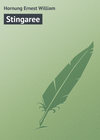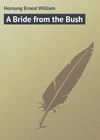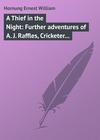Loe raamatut: «Young Blood», lehekülg 12
CHAPTER XVIII
MR. SCRAFTON
In the basement was a good-sized but ill-lighted room where three long tables, resting on trestles, were sufficiently crowded on the four days of the week when the day-boys stayed to dinner. On the two half-holidays only one table was in use, and the boarders scarcely filled it, with Miss Maudsley and Mr. Ringrose in state at either end. But on Sundays all meals were in the big schoolroom, and were graced by the presence of Mrs. Bickersteth's City sons, who brought with them a refreshing whiff of the outside world, besides contributing to Harry's enjoyment in other ways. He never forgot those Sunday meals. He was fond of describing them to his friends in after years.
At breakfast on his first Sunday he was quite sure that Mrs. Bickersteth had heard of the death of a near relative. Her face and voice were those of a chief mourner, and she appeared to be shedding tears as she heard the boys their Collect at the breakfast table, rewarding those who knew it with half a cold sausage apiece. The boys were by no means badly fed, but that half-sausage was their one weekly variant from porridge and bread-and-butter for breakfast, and they used to make pathetically small bites of it. Mrs. Bickersteth, however, scarcely broke her fast, but would suffer all day, and every Sabbath, from what Harry came to consider some acute though intermittent form of religious melancholia. Towards the end of breakfast the sons would come down in wool-work slippers, a little heavy after "sleeping in," and it was not at this meal that they were most entertaining.
The next hour was one of the few which Harry had entirely to himself. Most days he was on duty from eight in the morning to half-past eight at night, but the hour between Sunday breakfast and morning service was the new master's very own, and he spent it in a way which surely would have made Mrs. Bickersteth's remarkable hair stand straight on end. Even Sunday letter-writing was forbidden in her Sabbatarian household, and yet Harry had the temerity to spend this hour in composing vulgar verses for the Tiddler. He had discovered that contributions for the Saturday's issue must reach the office on the Monday, and it is to be feared that the consequent urgency of the enterprise led him into still more reprehensible excesses. What he could not finish in his bedroom he would mentally continue in church, whither it was his duty to take the majority of the boys, while the rest accompanied the Bickersteths to chapel.
The dinner that followed was what Harry enjoyed. It was an excellent dinner, and all but Mrs. Bickersteth were invariably in the best of spirits. This lady used to stand at the head of her table and carve the hissing round of secular beef with an air of Christian martyrdom quite painful to watch. Not that it affected her play with the carving-knife, which was so skilful that Harry Ringrose used to wonder why the schoolmistress must needs lap a serviette round either forearm, and a third about her ample waist, for the better protection of her Sunday silk. This, however, was a trick of the whole family, who might have formed the nucleus of a Society for the Preservation of Sunday Clothes. Thus Reggie, the younger and more dapper son, used to appear on these occasions in a brown velvet coat and waistcoat, with his monogram on every button, but would mar the effect by tucking his table-napkin well in at the neck and spreading it out so as to cover as much as possible of his person. Lennie, the elder and more sedate, though he had no such grandeur to protect, nevertheless took similar precautions; while the good-natured Baby used to pull off a pair of immensely long cuffs, the height of a recent fashion, and solemnly place them on the table beside her tumbler, before running any risks.
Water was the beverage of one and all, yet the spirits of the majority would rise with the progress of the meal. Reggie, who was a very facetious person, would begin to say things nicely calculated to make the boys titter; the elder brother would air a grumpy wit of his own; and Mrs. Bickersteth would shake the cap awry on her yellow head and beg them both to desist. The good-hearted Baby would add her word in vindication of the harmless character of her brothers' jokes, and at the foot of the table the governess would trim her sails with great dexterity, looking duly depressed when she caught Mrs. Bickersteth's eye and coyly tickled on encountering those of the gentlemen. Harry sat between Leonard Bickersteth and a line of little boys, and facing the flaxen-haired Baby, who gave him several kindly, reassuring smiles for which he liked her. The young men also treated him in a friendly fashion; but he was quite as careful as his fair colleague not to commit himself to too open an appreciation of their sallies.
The boys were in Harry's charge for the afternoon, but it seemed that on Sundays they never went for a walk for walking's sake. Occasionally, as it turned out, he would be requested to take them to some children's service; but on that first Sunday, and as a rule, they spent the afternoon in the smaller school-room upstairs, where some strictly Sabbatarian periodicals were given out for the day's use, and only such books as Sunday Echoes in Week-day Hours, and the stories of Miss Hesba Stretton, permitted to be read. Harry used to feel sorry for little Woodman on these occasions. He would catch the small boy's great eyes wandering wistfully to the shelf in which his Mangnall's Questions and The Red Eric showed side by side; or the eyes would stare into vacancy by the hour together, seeing doubtless his Devonshire home, and all that his "very superior people" would be doing there at the moment. Harry liked Woodman the best of the boys, partly because he had a variety of complaints but never uttered one. The new master was much too human, and perhaps as much too unsuited by temperament for his work, not to have favourites from the first, and Woodman and Gifford were their names.
After tea they all went off to evening service, and after that came a peaceful half-hour in the pretty drawing-room, where the boys sang hymns till bed-time. There was something sympathetic in this proceeding, the conduct of which was in Baby Bickersteth's kindly hands. The young lady presided at the piano, which she played admirably, and the boys stood round her in a semicircle, and each boy chose his favourite hymn. Lennie and Reggie joined in from their chairs, and Mrs. Bickersteth's lips would move as she followed the words in a hymn-book. When the last hymn had been sung, the schoolmistress read prayers; and when the boys said good-night she kissed each of them in a way that quite touched Harry on the Sunday evening after his arrival. He saw the boys to bed in a less captious frame of mind than had been his all day, and when he turned in himself he was rather ashamed of some of his previous sentiments towards the schoolmistress. He had seen the pathos of her pious depression, and he was beginning to divine the hourly irritants of keeping school at Mrs. Bickersteth's time of life. Instead of his cynical resolve not to take her seriously, he lay down chivalrously vowing to resent nothing from a woman who was also old. He seemed to have seen a new side of the schoolmistress, and henceforth she had his sympathy.
Indeed there was a something human in all these people; they had kind hearts, when all was said; and Harry Ringrose began to feel that for a time at any rate, he need not be unhappy in their midst. He had still to encounter the master spirit of the place.
When all the boys were standing round the long dining-table next morning, having taken turns in reading a Chapter aloud, Mrs. Bickersteth made an announcement as she closed her Testament.
"This term," said she, "Mr. Scrafton is coming at half-past ten instead of at eleven, and those boys who are to go to him will be in their places in the upper schoolroom at twenty-five minutes past ten each morning."
A list followed of the boys who were promoted to go to Mr. Scrafton that term; it ended with the name of little Woodman. Harry happened to be engaged in the background in the intellectual task of teaching a tiny child his alphabet. He could not help seeing some ruddy cheeks turn pale as the list was read; but Woodman, with a fine regardlessness, was reading a letter from Devonshire behind another boy's back.
Punctually at ten-thirty a thunderous knock resounded from the front door, and Harry was sorry that he had not been looking out of the window. He saw Mrs. Bickersteth jump up and bustle from the room with a most solicitous expression, and he heard a loud voice greeting her heartily in the hall. Heavy feet ran creaking up the stairs a few minutes later, and Mrs. Bickersteth returned to her task of hearing tables and setting sums.
Meanwhile Harry was devoting himself to the very smallest boys in the school, mites of five and six, whose nurses brought them in the morning and came back for them at one o'clock. About eleven, however, Mrs. Bickersteth suggested that these little men would be the better for a breath of air, and would Mr. Ringrose kindly take them into the back-garden for ten minutes, and see that they did not run on the grass? Now, Harry's pocket was still loaded with a missive addressed to the editor of Tommy Tiddler, which obviously must be posted by his own hand, and might even now be too late. He therefore asked permission to go as far as the pillar-box at the corner, in order to post a letter; and Mrs. Bickersteth, who was luckily in the best of tempers, not only nodded blandly, but added that she would be excessively obliged if Mr. Ringrose would also post some letters of hers which he would find upon the hall-table. So Harry sallied forth, with an infant in sailor-clothes holding each of his hands, and whom should he find loitering at the corner but Gordon Lowndes?
"Why, Ringrose," cried he, "this is well met indeed! I was just on my way to have a word with you. I was looking for the house."
The hearty manner and the genial tone would have been enough for Harry at an earlier stage of his acquaintance with this man; but now instinctively he knew them for a cloak, and he would not relinquish the small boys' hands for the one which he felt was awaiting his, though his eyes had never fallen from Lowndes's spectacles.
"I am not sure that you would have been able to see me," was his reply. "I am on duty even now. What was the point?"
"Is it impossible for me to have a word with you alone?"
Harry told the little boys to walk on slowly to the pillar. "It will literally have to be a word," he added pointedly. Yet his curiosity was whetted. What could the man want with him here and now?
"Very well – very well," said Lowndes briskly. "I merely desire to apologise for my – my hastiness when we met on Saturday. I fear – that is, my daughter tells me – but indeed I am conscious myself – that I quite misunderstood your meaning, Ringrose, on a point in itself too trifling to be worth naming. You may remember, however, that you asked me if I knew anything about a person of whose very existence I had just exposed my ignorance?"
"I remember," said Harry. "A mere slip of the tongue, due to my curiosity about the man."
"And is your curiosity satisfied?" inquired Lowndes, becoming suddenly preoccupied in wiping the dust from his eye-glasses.
"Well, I haven't seen him yet, though he is in the house."
"Ah!" said Lowndes, as though he had not listened. "Well, Ringrose, all I wanted was to tell you frankly that I didn't mean to be rude to you on Saturday afternoon; so I took the train on here before going to the City; and now I've just time to catch one back – so good-bye."
"It was hardly worth while taking so much trouble," said Harry dryly; for he knew there was some other meaning in the move, though as yet he could not divine what.
"Hardly worth while?" said Lowndes. "My dear boy, that's not very kind. I have always been fond of you, Ringrose, and for your own sake as well as on every other ground I should be exceedingly sorry to offend you. Things are looking up with the Company, you know, and I can't afford to quarrel with our future Secretary!"
And with that cunning unction he walked away laughing, but Harry knew there was no laughter in his heart, and that every word he had spoken was insincere. What then was the meaning? To keep friendly with him, doubtless; but why? And such were the possibilities of Gordon Lowndes, and such the imagination of Harry Ringrose, that the latter took his little boys back to the school with the very wildest and most far-fetched explanations surging through his brain.
In the hall he heard a strident voice raging in the schoolroom overhead. He could not help going a little way upstairs to discover whether anything serious was the matter. And outside the schoolroom door stood one of the biggest boys, crying bitterly, with his collar torn from its stud, and one ear and one cheek as crimson as though that side of his face had been roasted before a fire.
At one o'clock the whole school went for a walk before dinner, and it was then that Harry at last set eyes on the formidable Scrafton, as he came downstairs in his creaking shoes, with his snuff-box open in his hand, and his extraordinary head thrown back to take a pinch. There are some faces which one has to see many times before one knows them, as it were, by heart; there are others which one passes in the street with a shudder, and can never afterwards forget; and here was a face that would have haunted Harry Ringrose even though he had never seen it but this once.
A magnificent forehead was its one fine feature; the light blue eyes beneath were spoilt by their fiery rims, and yet they gleamed with a fierce humour and a keen intelligence which lent them distinction of a kind. These were the sole redeeming points. The rest was either cruel or unclean or both. The creature's skin was very smooth and yellow, and it shone with an unwholesome gloss. Abundant hair, of a dirty iron-grey, was combed back from the forehead without a parting, and gathered in unspeakable curls on the nape of a happily invisible neck. A long, lean nose, like a vulture's beak, overhung a grey moustache with a snuffy zone in the centre, and lost pinches of snuff lingered in a flowing beard of great length. The man wore a suit of pristine black, now brown with age and snuff, and Harry noticed a sallow gleam between his shoes and his trousers as he came creaking down the stairs. In warm weather he wore no socks.
"This is the new master of whom I spoke to you," said Mrs. Bickersteth, who was waiting in the hall to introduce Harry to Mr. Scrafton.
"That a master?" bellowed Scrafton. "Why, I thought it was a new boy!" And he let out a roar of laughter that left his blue eyes full of water; then he strode across the hall with a horrible hand out-stretched; the long nails had jagged, black rims, and in another moment Harry was shuddering from a clasp that was at once clammy and strong.
"What's your name?" asked Mr. Scrafton, grinning like a demon in Harry's face.
"Mr. Ringrose," said Mrs. Bickersteth.
"What name?" roared Scrafton. He had turned from Harry to the schoolmistress. Harry saw her quail, and he took the liberty of repeating his surname in a very distinct voice.
"Where do you come from?" demanded Scrafton, turning back to Harry, or rather upon him, with his red-rimmed eyes glaring out of an absolutely bloodless face.
Harry answered the question with his head held high.
"Son of Henry Ringrose, the ironmaster?"
"I am."
"I thought so! A word with you, ma'am," cried Scrafton – and himself led the way into Mrs. Bickersteth's study.
CHAPTER XIX
ASSAULT AND BATTERY
Harry was left alone in the hall. The boys were in the basement, putting on their boots. There were high words in the study, and yet Scrafton seemed to be speaking much below his normal pitch. Harry sauntered into the deserted schoolroom to avoid eavesdropping. And as if in spite of him, the voices rose, and this much reached his ears:
"I tell you it will ruin the school!"
"Then let me tell you, Mr. Scrafton, that the school is mine, and I have done it with my eyes open."
"The son of a common swindler! I know it to my cost – "
To his cost! How could he know it to his cost, this suburban schoolmaster? Harry had shut the door; he stood against it in a torment of rage and shame, his fingers on the handle, only listening, only waiting, for that other door to open. So in the end the two doors opened as one, and the two masters met in the hall and glared in each other's faces without a word.
"Mr. Ringrose!" cried Mrs. Bickersteth hastily.
Harry turned from the baleful yellow face in a paroxysm of contempt and loathing, and was next moment closeted with a trembling old woman whose pitiable agitation was another tribute to the terrible Scrafton.
Mrs. Bickersteth's observations were both brief and broken. She had just heard from Mr. Scrafton what indeed was not exactly new to her. The name was uncommon. Her sons had recalled the case on the arrival of Harry's application for the junior mastership. They had not painted the case quite so black as Mr. Scrafton had done, and they had all agreed that the – the sin of the father – should not disqualify the son. She had not meant to let Mr. Ringrose know that she knew (Harry thanked her in a heartfelt voice), but she had hoped that nobody else would know: and Mr. Scrafton knew for one.
"Do you want to get rid of me?" asked Harry bluntly.
The lady winced.
"Not unless you want to go. No – no – I have neither the inclination nor the right to take such a course. But if, after this, you would rather not stay, I – I would not stand in your way, Mr. Ringrose."
Harry saw how it was with Mrs. Bickersteth. She did not want to be unjust, she did not want to give in to Scrafton, but oh! if Mr. Ringrose would save the situation by going of his own accord!
"Will you give me the afternoon to think it over?" said he.
"Certainly," said Mrs. Bickersteth. "I wish you to consult your own feelings only. I wish to be just, Mr. Ringrose, and – and to meet your ideas. If you are going to town, any time before ten o'clock will be time enough for your return."
Harry expressed his gratitude, and said that in that case it would be unnecessary for him to absent himself before the close of afternoon school; nor did he do so; for he was not going to town at all.
He was going straight to Richmond Hill, to put the whole matter before Gordon Lowndes, and to beg the explanation he felt certain the other could give. Why should Scrafton have lost his colour and his temper at the bare mention of the name of Ringrose? Was it true that he knew that name already "to his cost"? Then how did he know it to his cost, and since when, and what was the subtle connection between Mr. Ringrose and this same Scrafton? Was Lowndes aware of any?
Yes, there was something that Lowndes knew, something that he had known on the Saturday afternoon, something to account for his surprise on learning to what school Harry had gone as master. He had indignantly denied all knowledge of Scrafton, but Harry could no longer accept that gratuitous and inexplicable repudiation. It was the very fact that he did know something about Scrafton, something which he wished to keep to himself, that had made him angrily disclaim such knowledge.
Harry was coming back to his old idea that Lowndes had been more deeply implicated in his father's flight than anybody supposed. He no longer suspected foul play – that was impossible in the face of the letter from Dieppe – but he did suspect complicity on the part of Lowndes. What if Lowndes had swindled wholesale in the ironmaster's name, and what if Scrafton were one of his victims?
What if Lowndes could tell him where his father lay in hiding abroad!
The thought brought a happy moment and an hour of bitterness; no, it were better they should never know; better still if he were dead. And the bitter hour that followed was the last and the loveliest of a warm September day; and Harry Ringrose spent it in walking across Ham Common and through Richmond Park, in the mellow sunset, on his way to Richmond Hill.
When he got there it was dusk, and two men were pacing up and down the little garden in front of Lowndes's house. Harry paused at the gate. The men had their heads close together, and were conversing so earnestly that they never saw him. They were Lowndes and Scrafton.
Harry stepped back without a sound. All his suppositions had been built upon the hypothesis that these two were enemies; it had never entered his head that they might be friends. To find them together was the last thing he had expected, and the discovery chilled him in a way for which he could not instantly account. He knew there was good reason for it, but in his first discomfiture he could not find the reason.
He stole back along the road, a shower of new suspicions sticking like arrows in his soul. The very vagueness of his sensations added to their sickening effect. His brain heaved as though with wine, and when he clapped a hand to his head it came back dripping. He was at the corner of the road before he knew what he was going to do, and there he spent minutes hesitating and considering. Unable to make up his mind, he crossed over and returned to reconnoitre from the other side. To and fro walked Lowndes and Scrafton, on the gravel path in front of the lighted window opposite; and faster than their feet, but lower than their footfalls, went their tongues.
Harry had not heard a word before. At this distance it was impossible for him to catch a syllable, and he was glad of it. He would watch his men and bide his time. It might be his best policy to do nothing, to say nothing, for the present; but he would keep an eye on the house while he thought it over.
The difficulty was for the observer himself to escape observation. The road was so quiet that if he strolled up and down, those other saunterers in the garden could not fail to have their attention attracted to him sooner or later. It was so narrow that they had only to look up in order to see him leaning against the paling of the opposite house. This house, however, was unoccupied, and behind the paling, in the segment of a circle formed by the shortest of suburban carriage drives, grew a clump of laurels which tempted Harry to do a very foolish thing. He crept into the garden of the unoccupied house, and from a point of vantage among the laurels he watched the two men in the garden over the way.
Up and down they walked, backward and forward, and their low voices never ceased; backward and forward, up and down; and now the light of a lamp made oval flames of Lowndes's glasses, now the taller Scrafton's cormorant profile was stamped for an instant on the lighted blinds, while the loathsome sound of his snuff-taking came again and again across the quiet road.
So these men were friends: and Lowndes had carefully implied that they were not even acquainted. Why should he have gone out of his way to do that? He had flown into a temper when that careful implication was inadvertently ignored; and had afterwards so feared the tell-tale effect of this unguarded outbreak that he had gone all the way to Teddington with elaborate apologies and ingenious explanations.
Stay: no: he had gone to Teddington with an ulterior motive, which only this instant dawned upon Harry Ringrose. Now he thought of it, there had been an obvious absence of premeditation about both the apology and the explanation; in fact, he had never before heard the fluent Lowndes hesitate so often for a word. Why? Because he had gone to Teddington that morning with quite another object, and at last Harry saw what it was.
He remembered Mrs. Bickersteth's announcement that this term Mr. Scrafton was coming half-an-hour earlier than formerly. He remembered how cleverly Lowndes had contrived to discover that Scrafton was already in the house. He had never forgotten Scrafton's face on hearing the new master's name. The thing was plain as daylight, and Harry only wondered how and why he had not seen it at once. Gordon Lowndes had gone to Teddington simply and solely to intercept his friend Scrafton, and to warn him that he was about to meet a son of the missing Henry Ringrose.
But why warn him? What had Harry's father been to Scrafton, or Scrafton to Harry's father? The lad's blood ran hot with suspicion, ran cold with surmise: there were the two men who could tell him the truth, there within twenty yards of him: he heard their every footfall in the gravel, heard one taking snuff, and the other talking, talking, talking in an endless whisper. Yet he could not walk boldly across the road and challenge them to tell him the truth! He was not sure that it would be a wise thing to do, but it galled him to feel that he could not do it. Lowndes loved a scene as much as he hated one, but Harry felt he could have stood up to Lowndes alone. Scrafton was a loathly being, but he would not have daunted Harry by himself. It was the two together, the coarse bully and the keen-witted man of the world, strong men both, whom the lad could not bring himself to challenge in cold blood. He had, indeed, too much sense; but, in an agony of self-upbraiding consciousness, he kept blaming and hating himself for having too little pluck. He thought of the motto on his bedroom wall at home. He would have it down; it was not for him. It was only for those who had some pluck to lose.
And as he cowered in the garden of the empty house, a white face among the leaves, impotent, bewildered, self-tormenting, the front door opened across the road, and a supple, strong figure stood so straight in the mouth of the lighted passage, a silhouette crowned with gold by the lamp within. For an instant Harry's heart seemed to stop, and the next instant to rush from his keeping to that lighted door. He had forgotten the existence of Fanny Lowndes.
"Dinner is ready," she said. Harry heard the words distinctly: there was no reason to lower that honest voice. But he thought that he detected an unwonted note of fear – one of disgust he could swear to – and instantly his mind was going over every conversation he had ever had with the girl, hunting for that unwonted note which was yet not entirely unfamiliar. He felt certain that he had heard it before.
"One moment," replied Lowndes; and his voice sank once more, and so continued volubly for some minutes: then the pair went in.
But Harry lingered among his laurels, strongly impelled to go incontinently with his questions and his suspicions to the one friend of whose sympathy he felt sure, of whose truth and honour there was no question. Yet to that one friend he could never go, for was she not also the only child of Gordon Lowndes?
And what then was his wisest course? Should he do nothing, for the present, but return to Teddington, continue in the school, and watch this Scrafton from day to day? Or should he wait until Scrafton was gone, and then confront Lowndes with an uncompromising demand for explanations? Prudence advised one course, gallantry another; but the question was to receive a sufficiently sensational solution. It so happened that the burglary season had set in early that autumn in the Thames valley, and the Richmond police in particular were already greatly on their mettle. A certain young constable, at once desirous of his stripes and yet not a little alarmed by his own enterprise, had obtained leave to go on his beat in noiseless boots, and he came into Greville Road about the time that Lowndes and Scrafton went indoors. Not a sound came from his muffled feet, but that only seemed to make his heart beat the louder; for it was a very human young constable, and the majority of the recent burglaries had taken place at this very hour, while the families were at dinner.
Suddenly the young policeman stood still and all but shaking in his soundless boots: for a few feet from his nose, where he least expected it, in the garden of an empty house, was a pale face among the laurels, with dark eyes upon the house across the road. A palpable burglar choosing his window. A desperate fellow, judging by his face, and yet one to be taken single-handed if he were alone.
Harry did not hear the hand feeling for the truncheon, nor yet the leather tongue leaping from the brass button; but he smelt the dark lantern burning about a second before the light was flashed in his face.
"Wad-you-doing-there?"
The low voice was drunken in its excitement.
Harry recoiled among the laurels, guiltily enough, for he was horribly startled.
"Come-out-o'-that!" growled the young constable through his teeth to prevent their chattering, and with his words still running together. "Come-out-o'-that; you've-got-to-come-along-with-me!"
"Why?" cried Harry, frightened into self-possession on the spot.
"You know why! Think I didn't see you watching that house? Out you come!"
The constable also was becoming master of his nerves. Harry, indeed, neither looked nor spoke like a very desperate person.
"Look here, officer," said he, "you're making a mistake. Do I look a burglar?"
"Come out and I'll tell you."
"Well, but look here: you're not going to run me in if I do?"
"I'm not so sure about that."
"You can't!" cried Harry, losing his temper. "What charge have you to bring against me?"
"Trespassing with intent! You may satisfy the sergeant, and if you do he won't detain you. But I've got to do my dooty, and if you won't come out I'll make you, but if you take my advice you'll come quietly."
"Oh, I'll come quietly," said Harry, "if I've got to come."
His tone was one of unaffected resignation. To be haled before the police was a new and most grotesque experience, at which he could have laughed outright but for the dread lest his superior officers might prove as crass as this callow constable. That he would have to go, however, appeared inevitable; and though the thought of calling Lowndes to vouch for his respectability did occur to him, it was instantly dismissed, and that of resistance never occurred to him at all. Harry was a very peaceable person, but he was also very excitable and impulsive, and what he now did was done without a moment's thought. He had opened the gate, which was wide and heavy, with the kind of latch which allows a gate to swing past the post on either side, and on the pavement stood a young police man with his lantern and something glittering in its light. It was a pair of handcuffs, and the sight of them was responsible for what followed. Instead of passing through the gate, as he seemed in the act of doing, Harry clapped both hands to the bar and rushed at the policeman with the gate in front of him. Every bar struck a different section of the man's body: his lantern fell with a clatter, his handcuffs with a tinkle, and he himself was hurled heavily into the road, along which Harry was scampering like a wild thing. At the corner he stopped to look back, because no footsteps were following and no whistle had been blown. The lantern had not gone out, for a jet of light spouted from the pavement half-way across the road, where it ran into a dark-blue heap. Otherwise the little road was quite deserted.




















